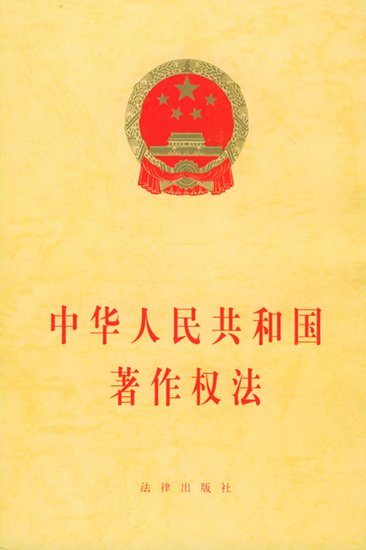New copyright law amendment under fire
- By Lu Na
 0 Comment(s)
0 Comment(s) Print
Print E-mail China.org.cn, April 6, 2012
E-mail China.org.cn, April 6, 2012
|
|
|
Copyright Law of the People's Republic of China [File photo] |
The National Copyright Administration published a preliminary amendment draft to revise China's copyright laws on its official website on Mar 31. Posted to collect public opinion and constructive feedback, bloggers and music producers singled out Articles 46 and 48 for closer study.
According to Article 46, any record producer who acts pursuant to Article 48 shall have the right to make recordings of musical works owned by another, without needing authorization from the original owner, given that the content had been published for three months or longer.
Article 48 stipulates guidelines for individuals or corporations who use non-original content: contact the National Copyright Administration department under the State Council; specify the original author and source of material; and submit a usage fee to the copyright collective administration organizations as stipulated by the National Copyright Administration within one month of use. The copyright collective administration organizations will then transfer payment to relevant parties.
Article 46 has dropped a bomb on the music industry, and has generated negative feedback from famous artists such as Li Guangping, Gao Xiaosong and Wang Feng. They believe Article 46 will harm the interests of original music producers.
"It is very difficult to popularize a new song within three months. Getting your song heard and appreciated by others is completely different from a song that has been around for years. This new amendment will encourage Internet copyright infringement," Gao Xiaosong commented in his blog. "The only positive byproduct of this amendment allows Chinese parties to record and distribute a new Lady Gaga album after it has been on the market for three months."
Wang Feng, a famous music composer and a singer, said that foreign countries have made stricter laws in order to protect intellectual property. However, the Chinese amendment has left him disappointed.
Zhou Yaping, CEO of Beijing New Run Entertainment Co., Ltd said that if Article 46 and 48 pass, record companies wouldn't invest in large advertising fees. This will harm original content producers.
Zhou also said that an additional consequence of the amendment will be a weakened purchasing position for record companies when bidding to assume control of a copyright once a singer loses their monopolistic control of their original work. This will lead to fiercer competition because many people will be singing the same song.
Article 48 also forces users to submit a usage fee to the copyright collective administration organizations within one month after using the original content. Zhou believes this will strengthen the power of the Music Copyright Society of China, while making the operating environment for record companies more difficult.
Many worry that a powerful Music Copyright Society of China will abuse its position by collecting shares of an artist's earnings.
Many organizations and agencies have started to generate support to oppose the amendment. Li Guangping set up a suggestion mailbox on behalf of Fuzhi Chenglin and Jin Zhaojun, the chairman and the standing deputy chairman of the Pop Music Society of Chinese Musicians' Association. The Record Industry Committee of China Audio and Video Association also posted on its blog that it will hold a meeting on Apr 9 and 10 to discuss the draft and consolidate its position to fight the proposed amendment.
However, many lawyers hold a different opinion.
Huang Chunhai, a lawyer at Chengdu Tahota Law Firm, said that the three month clause in Article 46 is good for music producers. Moreover, he thought the biggest conflict lies between music producers/writers and the copyright collective administration organizations.
Responding to Gao Xiaosong's blog, Ma Kun, a lawyer at Zhejiang Zeda Law Firm, said: "Copyright systems are created to balance the public interest against the private rights of those who control copyrighted materials. Every country has a compulsory licensing system. Our current copyright law includes licensing regulations for phonograms."
The copyright collective administration organizations have also expressed concern for the proposed amendments. According to Article 60, The copyright collective administration organizations are obligated to first obtain authorization from copyright owners, and will represent the interested party nationally. The copyright collective administration organizations can then apply to the National Copyright Administration to exercise the copyright and related rights on behalf of the interested party.
Peng Lun, a publisher said: "This extension of power forces all authors to be represented by these organizations."
However, Zhang Hongbo, Deputy Director General of the China Written Works Copyright Society, said that collective administration organizations and authors are likely to enter a trusting relationship. If you don't want other people to manage your interests and copyrighted material, you only need to establish this fact when publishing your works. The law won't require every individual to participate.
The maximum level of compensation for copyright infringement has increased from 500,000 yuan (US$ 79,238) to 1 million yuan (US$ 158,474).
The draft also adds administrative powers to pursue cases of copyright infringement.
Zhang Hongbo said that Internet-based intellectual property right infringement has become a serious problem in recent years, including P2P and e-commerce websites. The increased compensation maximum will hopefully dissuade Internet-based intellectual property infringement and piracy.







Go to Forum >>0 Comment(s)